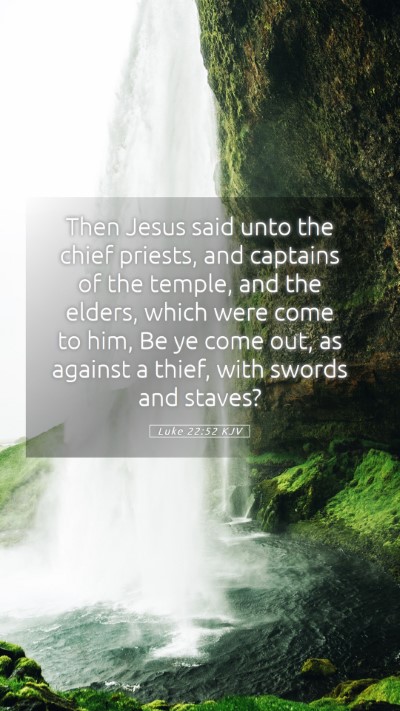Understanding Luke 22:52
Luke 22:52: "Then Jesus said to the chief priests, the officers of the temple guard, and the elders who had come for him, 'Am I leading a rebellion, that you have come with swords and clubs?'"
Overview
This verse captures a poignant moment during Jesus' arrest in the Garden of Gethsemane. It highlights the misunderstanding of the authority of Christ and the nature of His mission. The confrontation between Jesus and the religious leaders signifies a critical turning point in the New Testament narrative.
Bible Verse Meanings
In this verse, Jesus questions the motives of those who have come to arrest Him. The use of "swords and clubs" reflects the aggressive approach of the authorities and underscores the disparity between their expectations of a messianic warrior and Christ’s peaceful intent.
Bible Verse Interpretations
- Matthew Henry: Comments on how this statement by Jesus indicates His calm demeanor. Henry points out that instead of resisting, Christ addresses the gathered crowd with a question that reveals their misguided zeal.
- Albert Barnes: Reflects on the nature of Jesus’ life and ministry, indicating that He did not lead a rebellion against earthly powers, but came to fulfill spiritual redemption. Barnes emphasizes the contrast between Jesus’ peaceful message and the violent approach of His captors.
- Adam Clarke: Discusses the implications of the religious leaders’ actions in light of their spiritual blindness. Clarke notes that their methods of arresting Jesus foreshadow the rejection of the very essence of Jesus’ mission to save humanity.
Deep Dive into the Context
This moment occurs in the tension-filled hours leading up to Jesus’ crucifixion. The phrase "Am I leading a rebellion?" implies that those in authority fail to understand the true nature of Christ’s kingdom, which is not of this world (John 18:36). This moment is pivotal in showing how the leaders are threatened not by violence but by the truth Jesus represents.
Historical and Cultural Context
The historical context of this passage reveals much about the political climate of first-century Judea. The Jewish leaders feared Jesus’ growing influence among the people. His popularity posed a threat to their authority, prompting them to act decisively against Him, often resorting to unjust means.
Application of the Verse to Daily Life
Understanding Scripture requires us to consider how this verse interacts with our personal lives. Jesus challenges us to reflect on our own responses to misunderstandings or confrontations. We too may find ourselves in scenarios where our intentions are misinterpreted.
Related Bible Cross References
- Matthew 26:55-56 - Jesus questions the need for such armed force against Him.
- John 18:3-11 - The betrayal of Judas is described in the context of this arrest.
- Isaiah 53:7 - A prophecy about the suffering servant, paralleling Jesus' calmness in the face of trial.
Conclusion
This verse serves as a gateway to deeper biblical exegesis and reflection. It invites believers to examine the nature of conflict in their own lives and encourages a non-violent approach rooted in understanding and love, reflecting the teachings of Jesus.
Further Study Resources
For those engaged in Bible study groups or seeking online Bible study tools, consider exploring commentary collections, study guides that focus on the arrest of Jesus, or lesson plans that delve into the significance of His teachings during this time.
In-Depth Bible Study Insights
For a long-tail study, explore how to interpret Bible verses like Luke 22:52 within the context of New Testament narratives. Engage with questions regarding the historical context of Jesus' ministry and apply practical lessons from His life to modern living.


